#Corrupted Cinematic Universe
Explore tagged Tumblr posts
Text
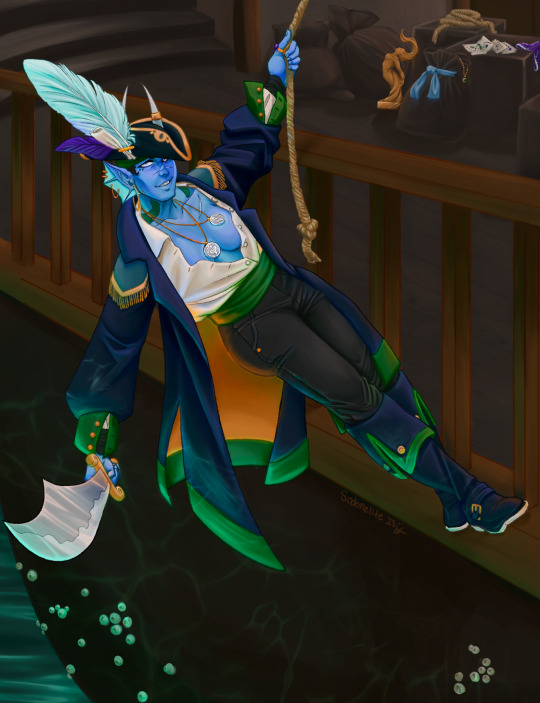
Yo ho, yo ho, a pirate’s life for me…
—☠️—☠️—
Some OC art that I’m really proud of! I spent a lot of time on this taking advice from friends and trying out some new techniques with coloring, so now all can bear witness to another one of my demon OCs.
#digital art#siobhan arts#art#drawing#demon oc#demon pirate#pirate#please if you see this and like it i would really appreciate a rb#according to procreate i spent a total of 32hrs and 7min actively working on this#and it’s one of my best pieces so far#ftr this is Mercer (he/she) and he’s a Prince of Envy#and head over heels in love with her lust demon girlfriend who im sketching atm#another character to add to the colorful cast of the universe we call#ccu#Corrupted Cinematic Universe#The Corrupted#even though it’s not cinematic it just roles off the tongue#anyways its just demons in hell and witches and angels sometimes i guess#it’s our little blorbo dollhouse :)#anyways i hope u like ty for reading this and also for looking at my art
14 notes
·
View notes
Text



Just some dreamswap related doodles I made a couple weeks ago
Dreamswap belongs to onebizarrekai
Informal DS AU belongs @alekspopug48 (pls accept this little gift I made for ur au)
#dreamswap#ds informal au#toasty cinematic universe#have some acrossnighterrors#cause they're about to cuddle while in their dinosaur onesies#ds dream#ds nightmare#dreamswap dream#ds cross#ds error#dreamswap nightmare#dreamswap error#dreamswap cross#corrupted ds dream#radiant ds nightmare#nebula doodles
262 notes
·
View notes
Text

I'm so chuffed to share the cover of my next book THE CORRUPTION OF HOLLIS BROWN with you all!✨
Written in the same vignette format as THE WICKER KING and ICARUS, Hollis Brown is another tale from your favorite girl set in the wilds of the Midwest about a boy and his ghost. This cover was designed by @mishko.co (https://mishko.co) in collaboration with the Harper art department. We were aiming for kind of an older style of YA horror novel. Very early aughts summer slasher vibes for this Monster Romance.
Expected publication March 25, 2025!
101 notes
·
View notes
Text
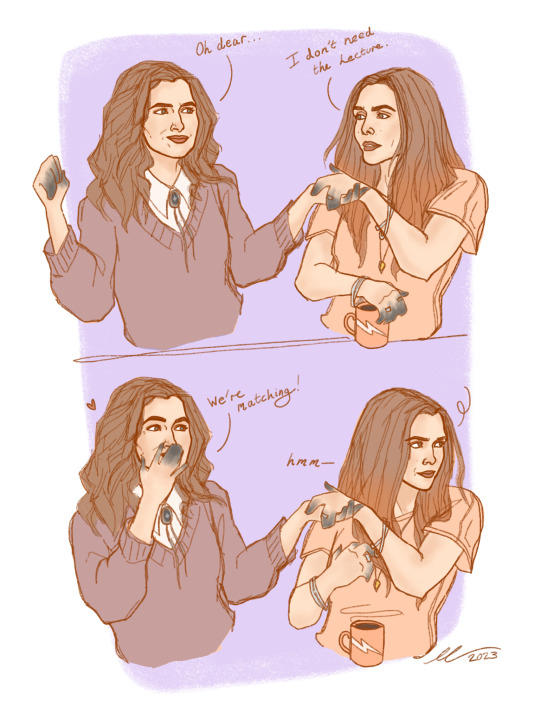
When they can both bond over the dark hold <3
#wandavision#wanda x agatha#wanda maximoff#agatha harkness#scarlet witch#marvel mcu#marvel fanart#mcu fanart#marvel cinematic universe#wagatha#fanart#own art#I just really like the idea of the dark hold corruption staying as a reminder#and not a fully finished piece but fun!
360 notes
·
View notes
Note
Would Steve Rogers from the marvel cinematic universe become an avatar of the corruption?

#steve rogers#captain america#marvel cinematic universe#mcu#the magnus archives#tma#polls#the corruption#mod Moth 🦋
22 notes
·
View notes
Text
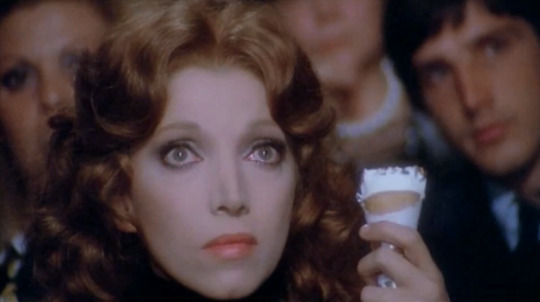
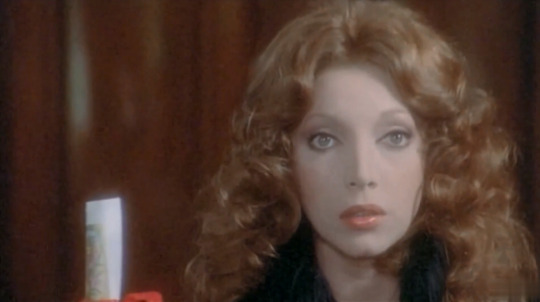
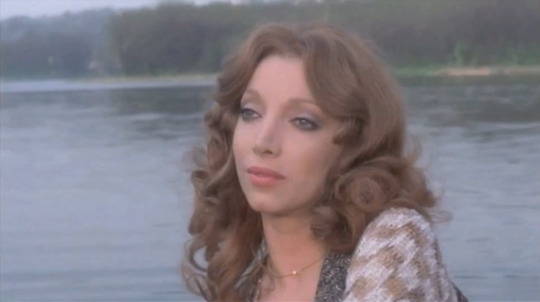
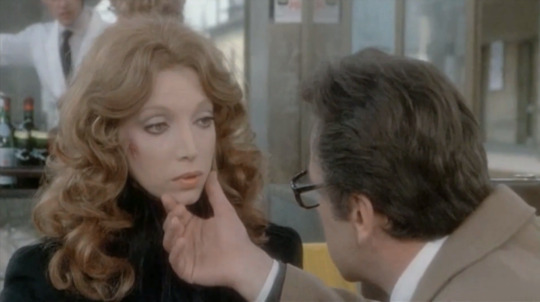
La Poliziotta (1974)
#great addition to the mariangela melato surrounded by a bunch of grotesquely horned up corrupt politicians cinematic universe#but this is the more feminist of the two! thank you women#mariangela melato#she looks so much like a doll here it's killing me#la poliziotta#la poliziotta 1974#steno#mine
84 notes
·
View notes
Text
x. dead wife flashback
i had a lot of fun with this one.
1 note
·
View note
Note
The removal of Negative Memories can create a Corrupted Soul.
Eh? What’s a corrupted soul?
#if you’re talking about data corruption I can just patch that :)#!cu#epprbcu#exclamation point pfp rpg blog cinematic universe#punctuationverse#beta testers
1 note
·
View note
Text
Okay this is absolutely ridiculous. Yes, there are good cops. I personally know a very good cop. The thing about the role of cop is that it is a position of power, and like all positions of power, it pulls in both the worst of people who want power, and the best of people who want to help others. Like every other group of people, there will be some good and some bad. And if you said "all _________ are bad" about any other group of people, you'd be absolutely destroyed for being racist, sexist, homophobic, or just appling generalizations. That is a double standard my friend.
Yes the system can be pretty messed up. But that doesn't make every person in the system messed up. The cops on the street who are just trying to stop crime and make the world a safer place are not responsible for the corruptions higher up or for the original origins of some of these laws that may have been oppressive. Yes, there are definitely bad cops. There are definitely those who use their power to hurt rather than help. But you can't put all the weight of a corrupt system on the lowest members of that system.
Now for Tom specifically, you cannot watch the movies with any sense of logic or morality and conclude that Tom is bad. All the evidence you use falls apart under any scrutiny.
1. He "wants more opportunities to shoot people"? What the heck? His whole arc revolves around the fact that HE WANTS TO HELP. He sees that in Green Hills there are very low stakes. There's basically no crime, and all he does is act as crossing guard and handyman. As he says about the little things they ask him to do, "they can ask anyone for that." He wants to provide help on a larger scale, actually do something that seems meaningful, actually help in a "life-or-death" situation. And by the end of Sonic 1, he realizes that these smaller things are also meaningful and are also a part of his job.
2. Took bear tranquilizers to kill racoons. Okay that was a little bit of a jerk thing to do, but if that's your worst thing to say about somebody, that's kinda sad. Besides, the whole tone of that conversation with Maddie makes it seem like he was mostly teasing about that. I'm not going to fight about this point, but like I said, if your biggest issue with someone is that they tried to kill an animal (not in a torturous or cruel way, I might add) you're pretty desperate to find something to complain about.
3. Dismissed Crazy Carl. Look, if you're literally any normal person and someone tells you they saw a "blue devil" out in the woods who runs really fast, you're not going to believe them. Especially if they keep saying it without ever bringing any evidence except a badly drawn picture. And Tom was very patient in that scene, listening to him even though it does sound delusional. The other people were laughing at him, but Tom wasn't.
4. Tom doesn't follow the laws because he didn't turn Sonic in. I thought your whole problem with cops was that they "uphold a system of laws that [are] designed to hurt and oppress". If Tom is a good cop, if Tom is a good person, then it's his job to serve and protect others above following the letter of the law. He chooses to rebel against the parts of the system that are wrong, so that he can fulfill his true oath to protect and serve people (and speedy little blue aliens.)
May I just add as footnote to the last point that in your post you use the term "good cop" in two ways, which causes confusion. You use it to mean "morally good/helping people" throughout the post, but then change it at the end to mean specifically "following laws/good at being a cop" (the exact thing you meant in that last statement was a little unclear), which doesn't make your argument strong. You argue that you can't be a "good cop" while upholding the law, but then argue that being a "good cop" means you must uphold every law. Now I believe that being "good" is to follow what's moral above what's dictated by human law, and that makes Tom a very good cop because he cares so much about helping people that he will punch government agents, risk being seen as a terrorist, hide Sonic from the government for a year (not to mention actually adopting him because he's a kid who's all alone) and then do the same thing again in the second movie, again adopting more kids who have no one else. He puts "protect and serve" above "obey every law". If that doesn't make him good, I don't know what does.
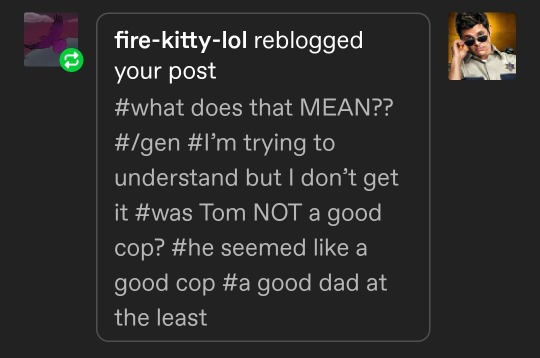
I don't want to clog up the notes of the poll so @fire-kitty-lol
there isn't such thing as a good cop. a "good" cop still upholds the system and laws that designed to hurt and oppress. listen there's sooo many resources on this, if you put in your own research you will find an answer to any question you have about this. and I've also talked about acab and why police are inherently bad on this blog a lot
and tom isnt even that good a cop??? I'm taking the tags from that post:
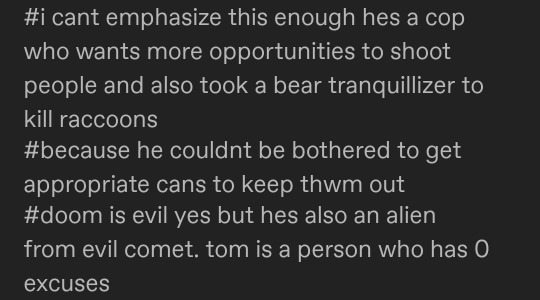
this sound like a good cop? someone you want to have an insane amount of power? "cops are meant to help people" tom literally was the most helpful person in the town, but he still want to leave and go to the city BECAUSE he said he doesnt feel like a real cop. kinda sound like he doesn't actually care about helping those around him, but instead feeling important. also his trigger control is non existent. also he made fun of and dismissed crazy carl because "he's crazy" - a cop acting like that towards someone who is (percieved to be) having mental health problems?? also if tom was a "good cop" and followed laws the movie would end pretty much immediately, since robotnik worked for the goverment and told tom to hand over sonic. funny how for tom to be the hero and good guy he had to break the laws that he swore and oath to uphold
#rant post#look i cannot stand this hate against tom any longer#i also understand that there's a lot of corruption in the police force but society does need people to make sure laws are being followed#this is not an apology post for bad cops this is a defense post for cops who are actually trying to make the world a better place#i definitely think the system needs to be overhauled#but stop hating Tom#he is a great dad#and a great cop#and if all cops were like him we wouldn't have the problems with corruption#tom wachowski#sonic movie#sonic movie 2#sonic cinematic universe#cops
115 notes
·
View notes
Text
This is gonna sound like a morality cop sentiment without the context that I am a person who is deeply enthusiastic about the aestheticized, eroticized violence of NBC Hannibal. But with that context in mind… I often find myself deeply put off by how violence is handled in fanfic, particularly post-canon fanfic.
Because Hannibal is a very dark show. It is thematically centered on the darkness that resides in all human beings, as embodied by the irresistible black hole that is Hannibal Lecter - a theme that most obviously manifests in Will Graham’s corruption arc, but also in subtler, more mundane ways with characters like Alana Bloom and Jack Crawford, who keep repeating their mistakes despite their self-awareness. And it’s a very nihilistic show, concerned not with ethics but aesthetics, with the pursuit of beauty in the absence of moral scruples.
And yet, violence and death always feel significant on this show. Despite (or perhaps because of) the frequent surrealism and black comedy in their presentation, they feel as if they have gravitas. And that’s precisely because of the show’s aestheticism. The corpses we see are so exquisitely mounted, and presented with such deliberation and intention, both in-universe and in the show’s cinematography. And thus these deaths feel as though they have weight, as though they mean something - even if the only meaning we derive from them is that they look beautiful, if ghastly, or that they convey cinematic symbolism.
But there is so much Hannibal fanfic where the violence feels so… disturbingly banal to me. Where the deaths don’t have any narrative weight and are completely trivial to our main characters. And this is imo completely out of keeping with even Hannibal Lecter’s own philosophy on the show, when he says that life is precious - not because he places particular value on life’s preservation for its own sake, but because he fully understands the gravity of what he is doing. His arrogance and sense of superiority is contingent on the understanding that the taking of a life is a serious thing, and a transcendent thing. Not flesh and blood, but light and air and colour. And I don’t see much light and air and colour in the kinds of fics that I’m talking about.
This is all very much entwined with the fact that a lot of these representations of violence seem to be bound up in the understanding that the show, and Will’s arc, is subtextually queer. And it absolutely is. But I often get the sense that these representations of violence, and the relationship between Will and Hannibal, are trying to overlay them with a very 2020s Positive Queer Representation approach, wherein Will and Hannibal’s love is misunderstood by the world, and thus their violence, as the symbol of their transgression, has to be portrayed and received by the audience an unalloyed good.
And this feels hard to explain, because of course this is a show that is very much about the pleasures of transgression. And it invites the viewer to share in that pleasure, in all the aforementioned ways. It’s drawing from a very 19th century Wildean mode in that regard - a sensibility that irreverently collapses all transgressions into one, and deliberately refuses to differentiate between the morally repugnant and the merely socially unacceptable. And that is very powerful as an engine for queer subtext, as it takes the very real feeling of being corrupt and tainted and wrong and leans into the seductive glamor of that corruption, rather than attempting to counteract that narrative (in ways that can feel, when in the throes of internalized homophobia, shallow and artificial).
But, within Hannibal, that thrill of transgression is inextricably bound up in horror. The pull of violence - and the bond it engenders between Will and Hannibal - is irresistible, but it is also a source of deep seated pain and terror. And those things are fundamentally not separable. There’s a sublimity to violence, and to desire, on this show - pleasure and pain, wonder and horror, are intertwined.
And a lot of the portrayals of violence-as-transgression as symbolic of queerness in fanfic just don’t grasp this. There’s an attempt to paper over the horror and the sublimity of the violence, and how it serves the queer symbolism. It always strikes me as though writers grasp that symbolism, but are trying to fit it into the mold of representation-as-a-means-of-social-advancement. It never lands for me and it leads to the aforementioned callous disregard for life that I just find distasteful. Which is not to say that I think portraying violence and murder in a manner that strikes a similar note to the show is an easy needle to thread - certainly not. (Not the least because it’s hard to translate the show’s visual language to writing.) But it is something I notice and that breaks immersion for me very quickly.
113 notes
·
View notes
Text
First things first, a lot of this is gonna come off as subjective. Because, it kinda is. I get that some people like stories like this, I get it- If you like it feel free to tell me why, and hopefully I could reframe my thoughts on it, please take this in good faith. but for me, personally, Arcanes ending truly sacrificed a lot of what I loved about the series in the first place all for a Marvel Cinematic Universe ahhh ending. Viktors whole schtik in the last two episodes feels like the stakes are way too unnaturally high, and... I'm just gonna call his dialogue what it is. Pretentious. "Emotion clashes with reason. Humanities self-corrupting contradiction." Emotion clashes with reason, wow, what a unique and interesting take. Such a deep political and philosophical take to boil down war into.... "Humans are so emotional." And I'm not saying he's portrayed as right- I'm saying his beliefs are flat out basic, unrelatable and uninteresting, at least for me. Compared to the season 1 villain. Silcos monologues- a revolutionary, who is willing to do whatever it takes to achieve his ideals of independence for Zaun, even if it hurts his citizens right now; who hated Vander for choosing complacency with Piltover to protect his kids, but is now softening himself because of his own adoptive daughter. We get him. His beliefs and arc are not only understandable but interesting and unique. It feels grounded, it's something we can relate to. I don't think many people relate with the perspective of "I am going to stop war by forcefully evolving everyone into a hivemind." Just. What. I just feel like the way they handled the magic plotline was very interesting from season 1 to act 2, and then felt super off the rails and tropey. Besides Viktor, too, a lot of the themes in the last episode feel deeply disconnected from what the series has been building up to. Noxus as a big bad villain? Come on, Ambessa never needed to act as a catalyst for Piltovers descent into complete fascism, Piltover was oppressive and neglectful from the very start. Adding a third party to scapegoat the blame onto just really weakened the overall political themes.
39 notes
·
View notes
Text

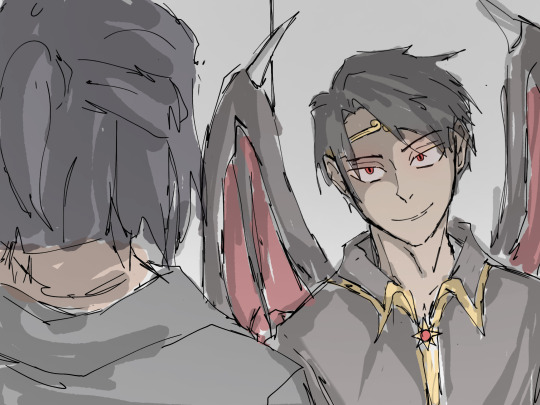
Nah he'll get executed in the end :>
#Another goofy ah post#nebula doodles#Just what i've imagined when dream got out of the cell#Had me giggling while making this#Based on the anime i watched; jujutsu kaisen#jmv#dreamswap#dreamswap dream#damien polarity#jmv obsidian#toasty cinematic universe#Corrupted ds dream#Out of context#Edit: Actually i wanna see obsidian getting butt kicked by cor. dream hehwheheh
160 notes
·
View notes
Note
i did not sleep. i have more to say about tv drama light yagami
tv drama light starts out very pathetic and seems like an everyman insert which annoyed me at first but now i think it's genius. the first few episodes he literally makes every mistake possible and overreacts to everything and is almost caught like five billion times. he gets given a tragic backstory to explain his need to act. absolutely nothing about this is anything like animanga light who is fairly unique in that he's a protagonist in a series that makes very little effort to make him relatable to the audience, so turning him into that everyman feels a lot like what my beloathed netflix tried to do ie a betrayal of what makes light light
BUT! the thing is, he goes from that position of absolute zero into being the light we recognise from the animanga EXTRAORDINARILY quickly. like, in a matter of episodes. and it's not because he's a normal guy who learns fast. the show tells us that he used to be idealistic and motivated, and we know he's always been exceptionally skilled. other characters question why he's stagnating when he could be achieving something great. tv drama light TELLS us thst he's been actively suppressing the part of him that is skilled and passionate because he's seen what it gets you, and now he puts actual effort into being a nobody and just trying to get by. as opposed to animanga light whose cynicism descends him into a bitter stupor but still has him maintaining the effort of being a top student etc etc even though he thinks the world is a lost cause because of his pride and reputation and because what else is there to do, tv drama light given his altered personality and additional tragic backstory has descended into nihilism because when you care 100% but have 0 power, you can't do a damn thing and all it gets you is suffering, so why care?
incidentally (re: my other post) this is a light who is TRYING to choose achilles' second fate - peaceful mediocrity. he is choosing to have no ambitions and to not care. but he can't get away from it. once he's given that catalyst (magic evil notebook, investigating with L) and forced to care and try, those hidden parts of him become uncovered VERY quickly. within a very short period, he goes from being a loser to being just as able and cunning as animanga light who started much further along and didn't allow his skill and passion to atrophy. this is showing us that light has always been extraordinary and that there's simply no suppressing it
incidentally this is more evidence to support my thesis that there is no way light or achilles can actually choose that second fate lmao it's a lie
back in your asks unfortunately you can’t get rid of me. i’m going to keep enablign you.
you bringing up the kr version of hurricane and the martyr complex light has in it is great bc what fascinates me about hurricane as a song is how radically different it is in different languages? as we all know in the manga light has this horrible visceral reaction to what he’s done. he looks like he’s gonna be sick when he has that guy hit by a truck. when ryuk turns up he admits that he’s been losing weight and barely sleeping. but the musicals differ so massively in how light is portrayed? because in english light seems to have this very strong sense of justice from the start - in where is the justice he denounces the corporations corrupting the legal system and asks “how can we turn away and say that’s just the way things are?” and then in hurricane he hardly seems upset at all by what he’s done. he seems vaguely surprised at how easy it was and then turns around and sings about how he’s got this insanely strong, perfect, untraceable power that he’s going to use to deliver righteous retribution. BUT then the jp versions of witj and hurricane are much less certain and light seems more horrified and then hopeful. the focus is on creating a perfect world, not necessarily punishment. he’s more a glass half full kinda guy. and then it changes AGAIN in the kr. it’s so fascinating he is a completely different version of himself in all three versions and i just need to ask. what are your opinions on this. am i making this up. do you understand how my brain is firing
you are NOT making this up and i DO understand how your brain is firing. listen. listen. in that same post about light/achilles (intertextual comparison not ship) (although?) and prompted by a response from someone else cool i reposted these tweets (which you have literally just seen because i shoved them at you but ill post them again so everyone can see)

to me it is like, very key that every iteration of light yagami SEEMS really different. in their behaviour, their values, what it takes to push them to acting and how they react, etc - obv you've brought up light as he appears in the three most well known languages the musical exists in, but i also am a huge fan of comparing his animanga self (already two different iterations to an extent) with the tv drama, which has maybe the most distinctive version of light out of all of them and which i BELIEVE? drew criticism? but i am not 100% because i was not here for this because i watched death note for the first time in fucking february. because i am hip with the kids. #rad
anyway this is part of a much larger ramble of mine that i am not really doing justice here but i actually really like that that version of light is so incredibly different - and yet he really isnt, somehow, because he ends up not only at the same ending but recognisable as the same person. that's what i think is so interesting! these differences are undeniably there and they're BIG - as you said, between musicals he ranges from being a vengeful guy on a power trip to being an idealist with a martyr complex, and you'd think those are two totally different sets of core values. between animanga vs tv drama he goes from being this cool and collected hyper prepared cynical idealist to being a depressed nihilist who's working extremely hard to shed his own ability so he doesn't have to deal with the pain of caring. again, these seem, and factually are, completely different sets of values.
and yet they're actually perfectly reconcilable. every iteration of light no matter how distinct and no matter how much their core values seem to oppose or contradict each other ends up reconciling into the same guy partway through the story, where all of these different directions he's been going in all converge. his priorities even out - regardless of if it was the power trip that came first or the desire for the perfect world, they balance ultimately and coexist. regardless of whether his idealism led him to bitter radicalisation or nihilism, they also balance ultimately and coexist. is light affected by his first murder? yes - how does it show it? that differs, but none of the lights are actually deluded enough to think that murder is good. they all think it's bad but defensible and justifiable and then visibly cope with that fact in different ways. light looks like a VERY different man depending on which of his values are being pushed to the fore in a given interpretation, but all that really does is serve to spell out exactly how complex he is internally once you watch them all converge at around similar points in the story, even when at the barest and most uncharitable interpretation he just looks like a maniacal serial killer with a delusional god complex. this is why i like him so much unfortunately
also none of this applies to netflix light who is irreconcilable and irredeemable. and white
#tune in next time i talk about light yagami when i argue that there are two key corrupting forces on him actually#one being the death note and the other being l lawliet#death note#rookposting#anyway i love the tv drama so much but you gotta consume it as a what if#its a supplement to the main series it cannot stand alone and you cant even really read it as an adaptation#it's wholly its own thing#light yagami cinematic universe im so lucky to have you. getting to reconcile so many versions of the same guy#such a treat#long post#AGAIN#and now im going to bed
52 notes
·
View notes
Note
steve rogers from the marvel cinematic universe pretty please!

#steve rogers#captain america#marvel mcu#mcu#marvel#the magnus archives#tma podcast#tma#which avatar would they be
32 notes
·
View notes
Text
The Traveller and the Tyrant
This is my honest review and critique of the Witness's characterisation. I would ask you to "enjoy", but, considering its themes and the fact that it is over 3,700 words long, perhaps a better phrase would be: "you have been warned."
When I loaded into Excision last week, I was immediately struck by the opening cutscene’s resemblance to the final, climactic battle of The Lord of the Rings, where the steadfast commander of humanity gave a rousing speech to his allied troops before bravely charging forward into the shambling mass of deformed, mutated enemy foot-soldiers, all under the shadow of a monolithic tower, the abode of the ultimate villain of the story. This was nearly enough to make me tune out, and, alas, what followed was not much better.
I have myriad complaints about the Witness’s portrayal in Destiny, and this cinematic is as good a place as any to begin. I do not think the introduction to Excision was fitting for the end of the Light and Darkness saga. Throughout the series, we have fought off a number of escalating threats, beginning with opportunistic Eliksni scavengers, and ending with a being that can end the universe itself. I do not think that a horde of Scorn ought to be the best this being can come up with for its final stand. I would have preferred to see it bend reality, drag us into the arm-tunnel shown in the trailer, shatter an allied warship on the spot, do anything, anything other than tread the worn war-paths of Sauron and his hundreds of imitators in various works of fantasy. First, because this is science fantasy after all, and second, because many of those themes are deeply rooted in xenophobia, unfitting for our current day and age.
The visual designs of the Witness itself and its precursors draw heavily from the historical and present cultures of southwest Asia and north Africa. Their monumental structures of stone evoke the architecture of the region. Their tetrahedral ships remind one of the Egyptian pyramids, and their murals, of the intricate paintings in buried tombs. They are said to hail from the sandy desert. The precursor aliens covered their heads and sometimes entire bodies in cloth; the concept art clearly contains sketches based on humans who dress this way, in burqas; and even the Witness is clad in a long, black robe that hides its lower face, showing only its dark, single brow and dark eyes. I could go on, but I believe I have said enough to back up my next statement: It was not a wise decision to base this particular sci-fi faction on the peoples of the Levant.
The Witness’s army of Scorn is portrayed as a savage horde, in stark contrast to humanity and our allies. The Scorn don’t even have guns. They have crossbows and torches, yet they are a deadly threat to our shining ships. We are told that our enemy is magnitudes more powerful than us, but we are shown that its troops hail from the Bronze Age. Why is the Witness not allowed to demonstrate its technological or paracausal superiority? We are told that it is made of many people, but it is single-minded, ruthless, and its cruelty is unmatched. In fact, its constituent minds are not even slaves; they literally do not have individuality until they dissent, and any dissent is, of course, summarily suppressed. These characteristics – the savagery or “backwardness”, the collectivism and despotism – are common Orientalist stereotypes. And to top it all off, the Witness is driven purely by religious fanaticism. Its robed, veiled selves are ontologically evil and irredeemable, except in death, naturally. I note that Savathûn gets a pass, decked out as she and her throne world are in Gothic imagery and ball gowns, and roll my eyes. And in the game, our characters speak of the Witness as a poison, a disease. A corrupter of all that is good. A foreign snake in our Traveller’s garden. There is concept art of that. Appalling.
I have always known that Destiny is a game made by and for Americans, or the West in general. I was even recently reminded of this by the way that Bungie hiked up the price of The Final Shape expansion for many non-USD currencies, but I still held hope for a satisfactory conclusion. I was too optimistic. It appears that even in this modern tale, the tired tropes that have plagued genre fiction since genre fiction existed are inescapable. I saw the Witness’s multi-armed form (reminding me immediately of Guanyin and perhaps others of Shiva) coming from a long way off, and I still laughed when I first finished Iconoclasm. It was like finding myself situated in that old drawing depicting the Christian nations of Europe as a group of humans, arming themselves against the distant, threatening silhouette of... the Buddha. An image published in 1895. Maybe a being with a thousand arms is threatening, who knows, but I’ve seen too many sticks of incense burnt before her altar to be afraid or awed. Buddhist villains are rare in fiction, and there was some potential in contrasting the Witness’s concept of the world as made of suffering with similar ideas in Buddhism, but the resemblance, in the end, was used for superficial, visual shock value. Sigh.
So then I went ahead anyway, defending the City upon the Hill (ringed with spears) against Satan, via feats of marksmanship and acrobatics through five exciting encounters, riffling through a diary that I picked up in the Monolith to try and learn more about my enemy. If I knew my enemy, and knew myself, then I could potentially complete Salvation’s Edge in a reasonable time-frame! Or not. The raid took my team and me a month and a half. Probably because the lore left me more confused about my enemy than I was at the start.
We are told that the Witness comprised a multitude when it first entered the Traveller, since people were still actively being cut out of it shortly thereafter. And then, by the end of Excision, the game implies that the multitude is gone, and only a single consciousness remains, which we kill with little fanfare (when we could’ve used a 2-minute cutscene. In my completely unbiased opinion).
Where did the many go? Did they all become dissenters? How? Why?
It is possible that, like the lower-case gardener described in page 2 of the raid's lorebook, all of the constituent minds grew frustrated with being unable to achieve perfection even with the Traveller’s Light, abandoned their original goal of imposing the Final Shape upon the universe, and were sealed off into statues one by one until only the last remained. But this would imply that we, the player, had little to do with the Witness’s downfall, that it imploded from its own loss of faith. Hardly a triumphant victory for us to brag about when we go home, and it comes with the “bonus” moral that mortals should not aspire to godhood because such attempts are doomed to failure. This explanation is too dull for me to accept.
The alternative, then, is that we did do something to cause the constituent minds to defect en masse. But I cannot, for the life of me, figure out what. Remember, we killed the dissenters to weaken the Witness. Why would committing murder make other people dissent, people that are one hundred percent committed to the Witness’s goal? I imagine myself as a sailor on a warship in the heat of battle, or a member of a raid-race team that has been awake for 47 hours straight. I see the enemy ship fire at me. I see the 48-hour deadline drawing closer and closer. What could possibly make me turn against my own crew, sabotage my own team? Yes, it could be because my captain has been yelling at me and I am completely fed up with them and I would rather die than suffer them for another minute, but that is also either a preexisting weakness that we merely exploit, or a stress fracture within the Witness that is caused by destroying everything and everyone it throws in our way, not by convincing these constituent minds that our philosophy and goals are better than theirs. Yes, this is the genre of game where shooting and slashing solves all problems, but come on. It could’ve been different.
On page 4 of The Rubicon, the raid’s lorebook, we learn of a previous occasion upon which the Witness was nearly defeated. Its adversary offered it peace, but the Witness struck it down. The dissenter narrating this story was not shocked into individuality by the betrayal, but by the fact that the thing they created to be literally single-minded in its pursuit of the Final Shape... is single-minded in its pursuit of the Final Shape? And then, more pertinently, the dissenter dismisses any notion that the Witness could be changed, and begs us little lights to not hesitate when we are the ones holding the knife to its throat.
This dissenter, while earnest, is wrong. The death of the adversary did change the Witness. It dislodged one mind from the collective, did it not?
So imagine, if you will.
We encounter the dissenters. We listen to their story. They beg us to destroy them to weaken the Witness. They desired to be exonerated in death, to be redeemed, to be saved by us and the paracausal entity behind us.
And we refuse.
We are given a blade, but we strike the statues with the hilt instead, cracking the stone. We pull their living flesh – made of what, we do not know, but it is living – from the rubble and we spirit them away to the camps we’ve made. We sit them by the fire and we protect them from retribution and, though these nocturnal beings do not see very well in the Light, the Witness sees, and it knows. It may seethe at how we escape its clutches time after time, it may sneer that we are making everything harder for ourselves, that we forget the ultimate goal is survival, but, through our selflessness and our seemingly endless capacity to forgive, we stir up hope within the multitude that what awaits them could be better than death, than even finality. They begin to remember the ancient enemies that once offered them mercy, and they are confronted by a new enemy who, for the first time, uniting Light and Darkness, has the power to defend such a truce. Slowly, they realise that they do not want to be our enemy. They are cast off. We save every person we can. And in the end, together with all our allies, we confront those vicious minds that remain.
But page number 4 shut that down, and all I’m left with is my fireteam member’s gripe that wow, this is just like how the United States deals with uppity foreign countries. It doesn’t really attempt to show that it is better, but prefers to fund dissident groups within the enemy state until it collapses, and everyone there is worse off. Which is harsh, but I can understand my friend’s position, since I have related gripes of my own. You see, the campaign forced me to protect the Traveller, the very model of a foreign interventionist, and I cannot overstate how much I resent that.
I started to become interested in Destiny’s lore after seeing some amazing fanart. Through copious amounts of research, I came to the conclusion that the Traveller is a downright bastard. If you haven’t read Shattered Suns, Rhulk’s backstory, you should. But below is a summary of what Rhulk said about his society as he sat on the Witness’s therapy couch, looking directly into the camera:
“Long ago, my planet, Lubrae, was inhabited by clans of hunter-gatherers. One day, the Traveller came and provided us with resources that helped us survive the dangerous flora and fauna of the forest where we lived. (It may have also genetically modified his people, if his ‘we evolved’ phrasing is to be taken at face value.) People were of two minds about how to continue after that. Some wanted to take advantage of these resources and settle down in a well-protected City. Others preferred to stay in the forest, and live like how they did before. As a result, they fought, and they were still fighting by the time I was born. I grew up watching the better-fed, better-armed City people murder members of my forest-dwelling clan on sight.”
His clan, Rhulk explained, was egalitarian, and relied on one another for safety. The Traveller’s uplifting of his species changed all of that. Lubraeans were able to manufacture Glaives and other tools to better protect themselves against the wildlife. The newly-introduced technology shifted their very conception of safety from the clan to the Glaive, from their fellow Lubraeans to objects that could be gathered into one City, be cordoned off, monopolised, hoarded, controlled. In that City, they invented oligarchy, soldiering as a profession, and the death penalty. They started to march troops into the forest, trying to rid it of its original inhabitants.
I have read books and reports on modern hunter-gatherer societies, and all of them conclude that first contact, if unavoidable, should be made with extreme caution. To quote the 2013 IWGIA report on indigenous peoples in voluntary isolation and initial contact:
“[When we make initial contact,] what we are actually doing is forming the spearhead of a complex, cold and determined society that does not excuse adversaries with inferior technology. We are invading the lands they live on without being invited, without their agreement. We are introducing needs they have never had. We are destroying extremely rich social organisations. We are taking their peace and tranquillity away from them. We are launching them into a different, cruel and hard world. Often, we are leading them to their death.”
I do not like how the narrative of Destiny persistently exonerates the Traveller. At times, a character will rail vaguely against the “chaos” it causes, and the most frequent complaint we hear about it is that it left their species too soon. Rhulk was, to my knowledge, the only one to see the Traveller come to his world, distribute its technology among his people, dump a pile of societal problems into their laps as a result, saunter off without so much as a word, and subsequently come to the conclusion that Lubrae never needed the Traveller in the first place. And he was correct; it never did. I hope it is abundantly clear that if humans were to ever encounter an alien planet inhabited by hunter-gatherers who are themselves hunted by predators, our first course of action should not be to hand out shotguns left and right.
But what if we granted them different technology, such as high-yield crops? If human history is anything to go by, they would go on to invent chattel slavery. Agriculture increased the efficiency of food production, but humans, instead of distributing the labour evenly, have universally chosen to create an artificial underclass, and then force them to perform the majority of the labour. This was true in 2000 BC, and it remains true today. The fact of the matter is, societal issues can be much, much more difficult to solve than technological ones. The Traveller tripled human lifespan? So what? Humanity has already doubled it on our own, but we’re still struggling with concepts like “women deserve rights.”
Some might say that it does not matter, because those aliens would have invented all these things sooner or later, both the good and the bad; that the Traveller merely eased their transition into a prosperous future. To which I would respond: it does matter. They must be allowed to choose their fate. At the very least, they deserve an answer for why their prayers for safety and sustenance were answered in this ham-fisted manner. We are told that the Traveller wants to grant us freedom, but all it does is run roughshod over peoples’ right to self-determination. Look at what it did to the Witness’s homeworld. It terraformed an environment that sapient beings were already living in. Were the precursors not already adapted to the dry environment, physically and culturally? What is the purpose of making a forest sprout from the sand? Is it for the benefit of the nomads of the desert, or is it to reinforce the audience’s preconception of how utopia should look? Why does the game’s narrative re-iterate that the precursors ceaselessly sought answers from the Traveller, framing them as greedy, entitled, and unsatisfied with the “blessings” bestowed upon them? If I were a precursor, I would have questions too: what was wrong with the way I lived before? Why do you get to decide how I ought to live? Is walking away even an option at this point? Paradise is a prison when you cannot leave. Lubrae’s Wanderers tried, but they could not escape the new material conditions that the Light had imposed upon them.
Humans have had our share of prophets, many associated with millennia of internecine warfare. Now imagine if God, literal God, showed up in the desert one day, and stuck around until we achieved interstellar flight. The Traveller destroyed the precursors. We’re the unfortunate ones who have to deal with the consequences of its actions, if not its words. Destiny’s narrative insists that because the Traveller was silent, it is not responsible for what befell the precursors. That is untrue. Silent or not, the damage was done. The Traveller touched world after world, sending their peoples into crisis after crisis, and all the lore says on the subject is how much the Traveller cares about all of them. Truly. It can care all it likes, as long as it stops wielding the weapon of mass destruction strapped to its belly. Come here. Hand over the beam.
My opinion may sound extraordinary, but I assure you it is not. The following are some translated user comments, taken from the most-viewed version of the Witness origin cutscene from the Season of the Deep uploaded on Bilibili (video ID BV1Jm4y1t7cn):
“I feel that Traveller was messing around with the entire universe. In order to stop it, the Witness's people discovered the Veil and the Darkness, and tried to stop the Traveller from flooding everyone with its ‘kindness’. This caused the Traveller to embark on a foolish journey, drawing even more species into a cosmic war, just so it can continue to spread its so-called grace.”
“In summary: the Traveller tosses technology everywhere to all species, and then every species wants to expand their territory. It’s just setting fires everywhere.”
“I think the narrative may end up depicting the Traveller as a neutral power, or even close to a villain. After all, its existence has disrupted the fates of many species in the universe. No matter its original intentions, its unilateral interference is not a good thing. I don’t know how the plot will resolve; whether Light and Darkness will no longer continue to interfere in the universe, or whether the Darkness (Veil) will show its true face after the Witness is defeated…”
I am not cherry-picking. These are all highly-rated comments. You can go see for yourself. It’s fascinating that reactions like these are almost completely absent from the Anglophone fandom. I only reached my own opinion on the Traveller after extensive research, yet these fans on Bilibili took one look at that cutscene, and instinctively decided that our war is the Traveller’s fault. A vast Pacific lies between the writers of Destiny, and the messaging these players saw in its story. The game insists that the Traveller is innocent, that it always had good intentions; these fans say that intentions don’t matter when its actions have been the ruin of so many. Self-determination is more precious than any paradise a foreign saviour can grant.
On page 5 of The Rubicon, we see that the precursors learned well from their god. They began to journey among the stars, and render aid unto the other species they encountered. They did one better than the Traveller, in fact, as it appears that they actually bothered to ask those species beforehand why they may or may not desire aid, rather than park their ships in their skies and skip straight to the terraforming. Unfortunately, after too many refusals, the precursors decided to go to an even further extreme than their god. They would interfere in the life of every being in existence, all at once, forcing them to exist in an eternal, perfect moment. And unlike the Traveller, they would tell everyone exactly what was coming. The Final Shape.
Early on in the eponymous expansion, we discovered that the afterlife exists. Cayde-6 was perfectly aware and conscious after his death, suspended in a bright and comforting forever alongside his Ghost, Sundance. He enjoyed the experience, and disliked being resurrected yet again. This raises an incredible number of questions, but the thing that stood out to me the most was how familiar it sounded. How much it resembled what the Witness promised. For Zavala to be reunited with Hakim. For Crow to be reunited with Amanda. For Ikora to find peace in victory. And for us to…
I do not think the Witness was lying when it offered all of those things. It was not lying when it gave each of its disciples a different vision of its ultimate goal. Whether it was capable of carrying through is one thing, but whether it was honest is another, and I believe it was honest. Its Final Shape is a natural extension of what Guardians receive in death. Whereas Guardians are granted a peaceful eternity with their Ghost, the Witness would try to simultaneously grant every sapient creature an end in kind, tailored to their individual desires. That is not to say, I agree with its end. The Witness was a tyrant as much as the Traveller is a bastard, especially since it threatened to punish people for eternity, too, out of nothing but the pettiness in its bitter heart. Yes, I concur, I am a pawn of the light, but I will not suffer to be your pawn, either.
What I wanted to say after that, rebuking its offer to make me into a disciple, is: “I will join you, if you let me save you.”
32 notes
·
View notes
Text
🎀 WELCOME TO MY BLOG 💸 *:ꔫ:*







TUCK ⊹₊ ⋆ ! she/her . may taurus. dominican american, 2022 shifter.
LINKS : s. scenarios (here ྀིྀིྀིྀིྀི) . my drs (here ྀིྀིྀིྀིྀི) . masterlist (here ྀིྀིྀིྀིྀི) .

ALL ABOUT SANNA : heyy dolls my name is savannah, but i go by many names, dawsin, tucker, and sanna. i’m mixed (african american & dominican), i use she/her pronouns, may taurus, og shifttok girlaa, summer fanatic, and i haven’t shifted (locking inn). ★
WHAT I’M INTO : i’m into shifting realities and writing. i’m working on more stories like headcanons, oneshots, ect. heavy hard christian (god stay with me), i’m a volleyball player and i’m also into basketball, trying to learn to play. i’m such a theatre geek and into musicals (future actress y’all). i’m a city girl, i was born to live in the city and i will not let anything get in the way of that. dystopian everything!! zombies, corrupt government, idccc give me 14 of em. i’m in love with fashion but god gave me the passion and not the talent😿. ★ ୧ ׅ𖥔 ۫ i’m a wonderer⋄ !!
I’M WRITTEN BY : Megan Thee Stallion, Jhene Aiko, Daniel Ceasar, A$AP Rocky, Frank Ocean, Saweetie, Tyler The Creator, Sade, J. Cole, Kendrick Lamar, PND, SZA, Paramore, Erykah Badu, Drake, Latto & Aaliyah. ★
FANDOMS : marvel cinematic universe, the walking dead, the maze runner, jujutsu kaisen, the 100, harry potter, stranger things, shameless, all of us are dead, jessie, on my block, attack on titan, good girls, enola holmes, grown-ish, hamilton, fuller house, descendants, outer banks, under the dome, avatar 1&2, & gilmore girls. ★
MY REALITIES : fame dr (i have 3), actor/rwe dr, harry potter dr, amp dr, royalty dr, on my block dr, aouad dr, twd dr, better cr (i have 2), nfl wife dr, aot dr, nyc drill dr, mid90s dr, shameless dr, youtuber dr (i have 2), grownish/college dr, mcu dr, miss peregrine's home for peculiar phildren dr, & parent dr. ★ ୧ ׅ𖥔 ۫ i will NOT accept a life i DO NOT deserve⋄ !!

Thank you for reading !! - muchluvsanna 👛
#attack on titan#shifting community#shifting blog#shifting motivation#shifting scenarios#imagine#the walking dead#stranger things#enola holmes#the maze runner#the 100#across the spiderverse#oneshot#jjk#harry potter#disney
11 notes
·
View notes